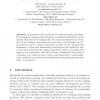Free Online Productivity Tools
i2Speak
i2Symbol
i2OCR
iTex2Img
iWeb2Print
iWeb2Shot
i2Type
iPdf2Split
iPdf2Merge
i2Bopomofo
i2Arabic
i2Style
i2Image
i2PDF
iLatex2Rtf
Sci2ools
107
click to vote
COLT
2005
Springer
2005
Springer
Ranking and Scoring Using Empirical Risk Minimization
A general model is proposed for studying ranking problems. We investigate learning methods based on empirical minimization of the natural estimates of the ranking risk. The empirical estimates are of the form of a U-statistic. Inequalities from the theory of U-statistics and Uprocesses are used to obtain performance bounds for the empirical risk minimizers. Convex risk minimization methods are also studied to give a theoretical framework for ranking algorithms based on boosting and support vector machines. Just like in binary classification, fast rates of convergence are achieved under certain noise assumption. General sufficient conditions are proposed in several special cases that guarantee fast rates of convergence.
Related Content
| Added | 29 Jun 2010 |
| Updated | 29 Jun 2010 |
| Type | Conference |
| Year | 2005 |
| Where | COLT |
| Authors | Stéphan Clémençon, Gábor Lugosi, Nicolas Vayatis |
Comments (0)

